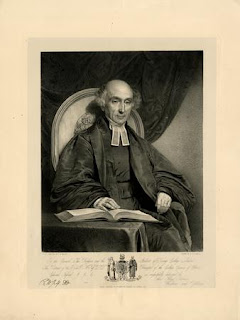"Not as mediators but as media": Jelf's Bampton Lectures and sacerdotalist claims
At the close of the third of his 1844 Bampton Lectures, An inquiry into the means of grace, their mutual connection, and combined use, with especial reference to the Church of England, Jelf - one of those whom Nockles lists as the 'Zs', the post-1833 continuation of the Old High tradition - gives expression to the Old High rejection of sacerdotalist claims. "A due appreciation of the pastoral functions, a persuasion of their Divine origin and of their Divine efficacy", he insists, does not lead to "sacerdotal pride". This is a crucial aspect of Old High piety, entirely incompatible with a sacerdotalism which necessarily exalts clergy over laity. The experience of the Old High parson - often married, with domestic responsibilities, not receiving holy Communion apart from his parishioners, participating in communal and political affairs alongside his neighbours, ministering the modest rites of the Prayer Book - stood apart from the experience of a sacerdotal caste. (It is worth noting how this would signal a significant gulf between the Old High tradition and those who followed the Tractarians with Ritualism and Anglo-catholicism.) Jelf particularly notes how the refusal to give the title 'Sacrament of the Gospel' to Holy Orders exemplifies this rejection of sacerdotalism:
we dread the undue exaltation of "the gift" of Orders under cover of an ambiguous name; we refuse to place it on a level with the two holy "Sacraments of the Gospel", and to degrade Baptism and the holy Eucharist in order to "magnify the office" of those who administer them . Knowing the corruption to which this error has led the Church of Rome, we refuse, then, to call Holy Orders "a Sacrament"; whilst, on the other hand, dreading equally the depreciation to which levellers would reduce "the gift", we place it amongst the sacramentals, and believe it to be a means of grace. In a word, we regard the Clergy not as mediators, but as media; as the channels, not the depositaries of grace; as the stewards of God's household, not as lords over His heritage: we reverence for Christ's sake the dispensers of the Divine mysteries in the Font and at the Lord's Table, whilst we abhor that impiety, which, as a consequence of the error of transubstantiation, has led some of the Romish hierarchy to arrogate to themselves, or to suffer their advocates to claim for them, the title of "creators of the Body of their Creator". God of His infinite mercy grant us grace, that we may continue to "preach not ourselves, but Christ Jesus the Lord, and ourselves your servants for Jesus' sake".




Comments
Post a Comment